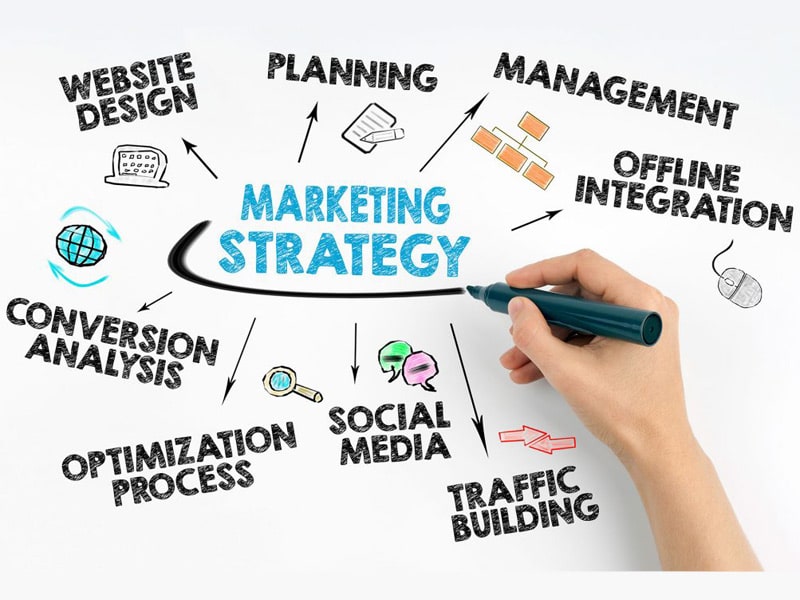The basic goal of any business is to make a profit. But the entrepreneur who is interested in making a profit only here and now, always need to think for the future: how your company will develop, with whom to compete, what product to offer customers.
The marketing strategy is a long-term, forward-looking approach to planning the company’s activities in order to achieve a sustainable competitive advantage.
As a rule, the marketing strategy is fixed in the marketing policy of the company in the form of a special document. But even if it is not in physical form, there is a marketing strategy in one way or another – at least in the head of a manager or marketer.
WHY A MARKETING STRATEGY IS NEEDED
Marketing strategy should not become a dead paper load. A good strategy is a working strategy.
Marketing strategy should indicate the vector of development of the company and its product, to become a kind of benchmark in the decision-making process. A good marketing strategy should answer questions not only about what, how, for whom to produce and how to sell, but also what to do if something goes wrong.
An effective marketing strategy unites and concentrates the company’s forces to obtain competitive advantages, and coordinates the work of all business units.
Marketing strategy allows you to competently establish work with the audience: to win its loyalty and even to form a community around a brand or product. If the strategy provides for alternative options for the development of a product, it will allow for changes to be made in accordance with the needs of customers without fear.
Financial aspect is also important: having a competent strategy, you can significantly reduce the cost of marketing. For example, having studied in detail the target audience, the entrepreneur will know that certain sales channels and advertising creatives will not be suitable, and therefore will not be spent on them. In addition, the marketing strategy involves budgeting and marketing plans, which spells out the activities and costs.

COMPONENTS OF A WORKING MARKETING STRATEGY
Marketing strategy never starts from scratch. It is based on the company’s value proposition. This value proposition extracts key meanings that take the form of marketing messages.
It is impossible to make a competent marketing strategy without analyzing the initial situation. It includes analysis of the company’s market position, growth opportunities and threats to it, strengths and weaknesses of the business, competition, etc. Also within the framework of analytical activities it is important to study the target audience and its individual segments.
Any marketing strategy has a goal. It can be final and specific, for example, the growth of sales or profits to a certain level, or can be formulated indirectly: winning market share, occupying a dominant position in a certain segment, industry leadership, etc.
An effective marketing strategy should cover all components of the marketing mix – product, price, location and promotion. Thus, it is necessary to provide for the prospects of development and modification of the product, its positioning for different segments of the target audience, as well as opportunities for differentiation.
At least in general terms it is necessary to prescribe a pricing policy (but not to be sprayed on details like discounts and actions – it can be prescribed in the marketing plan). Also it is necessary to think about platforms and/or platforms on which the product will be extended; to develop distribution channels, to think over questions of logistics and merchandising.
The strategy should also cover opportunities to promote the product – in particular, distribution channels (taking into account the possibility of new ones). The strategy of communication with the customer should become a part of the marketing strategy: it is necessary to decide at once how the brand will communicate with the client, which one will choose tone of voice, etc.
The strategy should also include a budget. Naturally, it is not a question of calculating the cost of marketing activities for years to come – there are marketing plans for this.
MARKETING STRATEGY VS MARKETING PLAN
Marketing strategy is often confused with the marketing plan. What is the difference?
A marketing plan is an operational document, while a strategy is a general view, a certain vision and vector.
A strategy is something more global and static (although a marketing strategy sometimes needs to be reviewed and adjusted, it will go further). The strategy is based on the value proposition of the brand, and it almost never changes: it would mean changing the brand as a whole. The marketing plan is more dynamic, specific and subject to change, as it is prepared taking into account the current situation.
The marketing strategy formulates the key idea of the business; the marketing plan solves the problem of translating this key idea: platforms, channels, terms, creativity.
The marketing plan, although a necessary document, is secondary to the strategy: it would be meaningless if there was no strategy with its value message and goals.
The economic situation is constantly changing. Every day, new channels of communication and sales appear, hundreds and thousands of new companies and products appear. And what about the moods and tastes of the audience! To be successful, businesses have to adapt to these changes. It is no coincidence that the methods of flexible planning of business processes have recently become increasingly popular.

